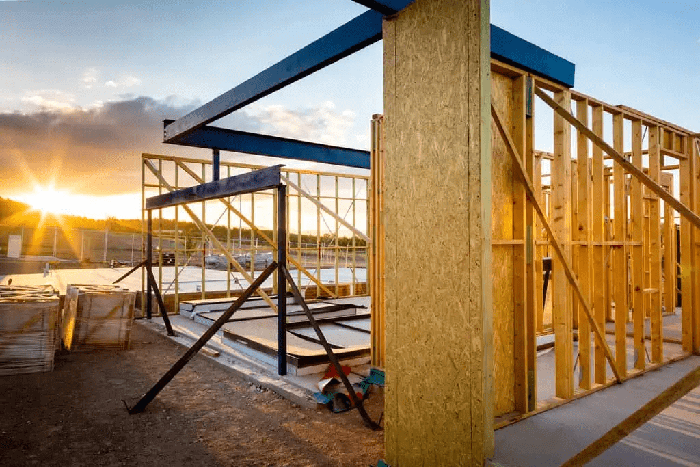Are you looking to build a new home or make substantial improvements to an existing one? A construction loan could be the ideal solution. Residential construction loans offer a flexible financing solution that can be tailored to your needs. To find out more, speak with one of our experienced mortgage brokers today!
Construction loans are a type of loan used to finance the cost of building a new home or renovating an existing property. A construction loan allows you to draw down money progressively whilst completing different stages of the construction project. They are designed to ensure you don’t draw down more than necessary or exceed your budgeted construction costs.
Construction finance loans are suited for home construction only. This means that they are available for houses built and kept for personal investment or residential purposes. If you’re planning on constructing dwellings that you intend to sell immediately, then talk to a mortgage broker about what kind of finance solution would be best for your project.

Most construction home loans can only be used when you’re contracting a licenced builder. This means that they’re generally not suitable for DIY construction projects.
Construction loans are designed for new builds or extensive renovations or extensions to existing dwellings. For a small-scale renovation (such as a basic bathroom upgrade), it may be more beneficial to refinance your existing home loan to access equity or apply for a personal loan.
But how do construction loans work? Basically, they’re structured so that the lender releases funds through a series of progress payments, rather than as one lump sum amount.
For example, you may receive 5% of the loan to pay your initial deposit to the builder, then an additional 20% once the foundations of the home are completed and the builder has invoiced for these works. This kind of loan arrangement can save you a substantial amount of interest over the life of the loan, while also making it easier to manage an existing mortgage simultaneously with construction finance.

Note: Talk to your mortgage broker if you would like to apply for construction finance on an existing home, as the process can be a little different.
When it comes to construction loans Australia has two basic financing options:
Since construction financing arrangements can vary, it’s a good idea to speak to your mortgage broker to discuss your construction requirements. They can provide expert advice tailored to your situation.
Talk to your mortgage broker so you can establish your estimated borrowing capacity. This will help you to work out whether you can borrow enough money for the house and land, while still being able to manage rent, pay bills and cover your basic living expenses until the construction is completed.
The next step is finding a suitable block of land for your new home. When looking at potential options, make sure to consider the following:
You’re now ready to start researching ideas for your new home (this is the fun part!). Check out local display homes and talk to reputable builders operating in your area. This will help you to get a better idea of what you like and an accurate estimate of costs for your proposed construction project.
Once you’ve found your ideal parcel of land, you’re ready to make an offer and get the land under contract. Make sure to discuss the following before finalising the sale:
As soon as you have a contract on the land, you should start organising the construction. The first step is to finalise a set of plans.
Are you working with a project builder? Do they have designs for you to choose from? Or will you need to engage an architect for a more custom design?
You’ll need to obtain itemised quotes from builders in the form of a tender submission. This should include all the specifications, finishes, inclusions and allowances for the build.
Whether you’re planning a large-scale renovation or building a new home from scratch, you’ll find that construction loans are similar in many ways to a traditional mortgage. But as a specialised loan designed specifically for construction projects, it also offers many advantages not available with conventional mortgages.
Draw down your construction loan for each completed stage of the project (as required) and only once the inclusions and quality of finish have been approved by you.
You can choose loan terms set around the needs of the project to help manage your cash flow. Interest only payment terms are ideal for while construction is underway.
Pay interest only on funds that have already been drawn down, and not the whole amount upfront. This means lower repayments for you throughout the project and less interest.
Save on stamp duty, since it’s usually only paid on the land price, not the value of the home. Some states also offer generous concessions and grants for building a new home.
Construction loans can shield you against sloppy or incomplete work. Payments are only released after each stage of the build is completed to the required standard.

The progress payment team will ensure they have all the documents required to make the progress payments (e.g., council-approved plans, insurances, FHOG approval, builder receipts for deposit, etc.).
Once this process is complete, the bank will issue a commencement letter to the builder so the builder can begin work on the site. The builder will likely require a 5% initial deposit payment prior to work commencing.
Once the foundations are complete, the builder will send you an invoice for the first construction payment. All loan applicants will need to sign the invoice and forward it to the lender. Some lenders will also have progress payment forms that need to be signed and sent in with the builder’s invoice.
Continue to follow this process with each invoice you receive from the builder. Please note most builders have strict 7-day terms for these payments to occur. If the payments take longer than this, you could incur penalty interest as per your building contract (check term details).
To ensure prompt payments, immediately forward builder invoices through for payment. Most progress payments should occur within 72 hours of the bank receiving the signed progress claim.
Before the bank makes the final progress payment, they will require an official valuation. You should expect this payment to take at least 5 working days depending on the valuer’s access to the site and the bank’s progress payment queue.
To apply for construction loans in Australia, you should start by contacting an experienced mortgage broker. They can research lenders, assess your budget and check eligibility criteria to find the most suitable construction finance product to suit your needs.
They can also help you to complete the lender’s application form, where you’ll need to provide personal and financial details. Along with photo ID and proof of income, you’ll also need to supply the following documentation:
Your broker will then submit the completed application along with these documents for lender review and approval.
While owner builder finance is less common, there are several lenders in Australia who offer these kinds of loans, including banks, credit unions and specialist mortgage providers. When considering lenders, it’s important to compare rates, fees, loan terms and features to ensure you get a competitive loan product that is suitable for your needs.
ZEP Finance has access to a wide panel of lenders. This means we can negotiate great deals on your behalf, and potentially ensure preferential treatment for your application. For up-to-date advice on who offers competitive owner builder construction loans, talk to ZEP Finance today.
Land and construction loans are typically two separate loan products that may be bundled together for added convenience. Initially, you’ll secure a standard loan to purchase your preferred block of land. You’ll then apply for a construction loan to fund the building process.
Alternatively, you can apply for a land and construction loan where your first drawdown would be for the land, and the subsequent progress payments would cover each stage of the construction process.
Most construction home loan repayments will be interest only while the construction project is underway, making it easier to manage cash flow. The land and construction loan will then typically convert to a traditional mortgage (with principal and interest repayments over a 25- or 30-year term) once construction is finished.
Construction finance is available for large-scale renovations or extensions of existing homes (typically starting at $100,000). The renovations to be made on an existing property must also be structural in nature. Simple projects like adding doors, windows or anything of this nature will not be eligible for a construction loan.
Similar to a new build construction loan, you’ll need to start by determining the project scope and costs, then apply for the loan with detailed plans and cost estimates.
Once the loan is approved, funds will be made available in stages based on the progress payment schedule in your contract.
Construction finance products may attract higher fees compared to a traditional mortgage, since the lender will need to do multiple valuations of the property. With funds being released in stages (rather than as a lump sum), there is also considerably more admin work for lenders managing loans for construction.
As of April 2024, various lenders were offering construction loans with comparison rates of between 6.20% and 8.75%.

ZEP Finance Pty Ltd ABN 44 139 018 643
Credit Representative 374069 is authorised under Australian is authorized under Australian
Mortgage Brokers Lennox Head | Home, Land, Investment Loans Byron Bay, Ballina, Northern Rivers & Lismore
Location
5/74 Ballina St, Lennox Head, NSW, 2478
Email Address
Phone
Copyright 2022 © Zep Finance